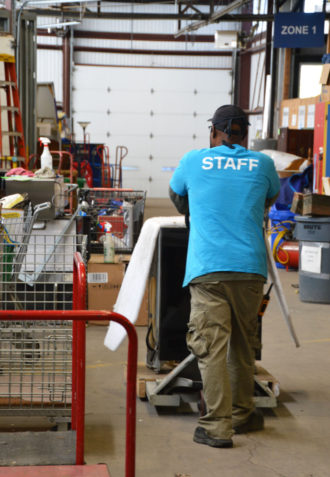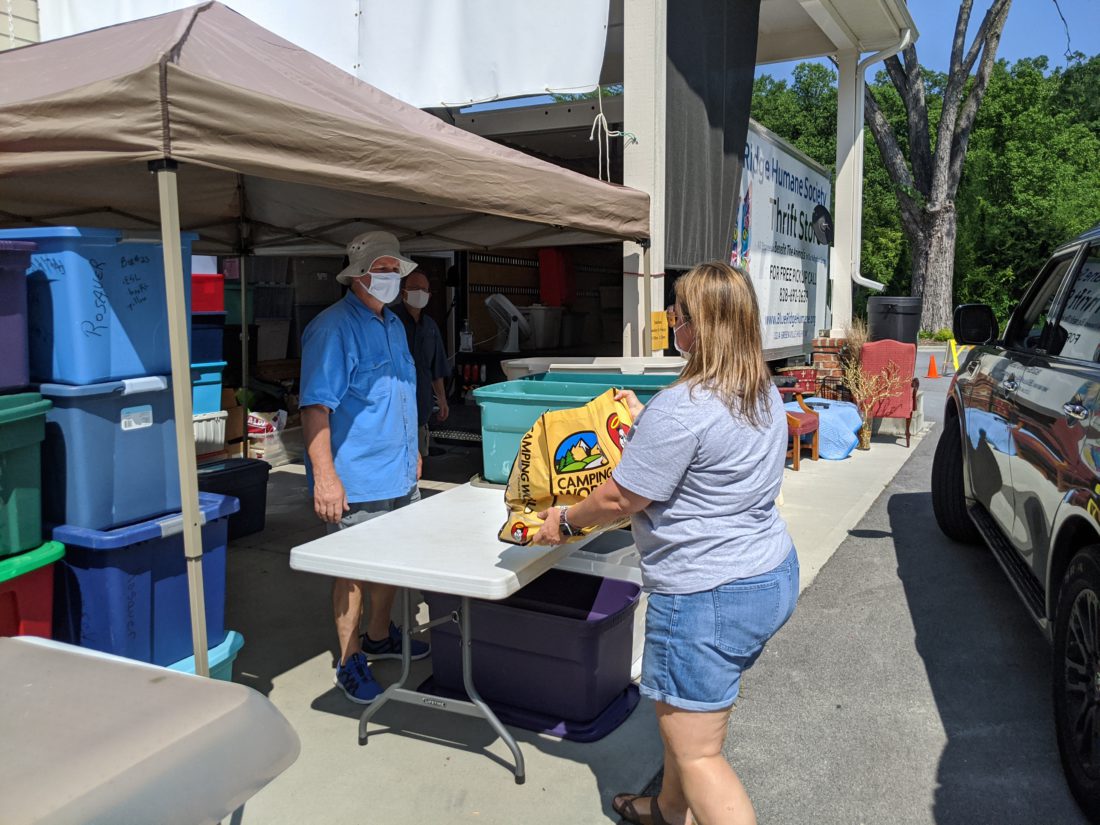When Angela Prodrick decided to resume accepting donations for the Blue Ridge Humane Society’s thrift store at the end of June, she had an inkling that donation levels might be high. After all, statewide lockdowns were just beginning to lift, and Prodrick, the nonprofit’s executive director, suspected that many of the store’s longtime patrons had dedicated part of their time in quarantine to spring cleaning.
But once the floodgates opened, staff and volunteers soon found themselves drowning in donations, communications manager Laura Rice explains. Devoted donors brought in box after box of secondhand items they’d saved to give to the thrift store, which raises money to support the Henderson County animal shelter. An avalanche of clothes, furniture and trinkets piled up as volunteers scrambled to keep up.
It quickly became too much of a good thing, says Rice. On Oct. 23, the organization made a highly unusual call, halting all incoming donations until after the holiday season.
“We were inundated,” Prodrick recalls. “Thrift store donations are one area where people think they can assist the organization with something that’s easy to do, but we really needed to press pause and pull the plug for a few months.”
Other area nonprofits are seeing a similar trend, even if they haven’t stopped accepting donations. “Everyone has been so, so generous, but we really have gotten a crazy amount of stuff brought in to our store,” reports Skip Wade, director of retail operations for the WNC Bridge Foundation.
By the truckload
Long before COVID-19 arrived, decluttering and downsizing had become a growing trend thanks to the influence of organizational guru Marie Kondo, Goodwill spokesperson Jaymie Eichorn notes. As more folks are stuck at home, says Eichorn, the nonprofit’s regional vice president of marketing and communications, they’re tackling home improvement projects and purging living spaces of unwanted items.
In the months since the pandemic began, Goodwill stores across Western North Carolina saw the biggest influx of donations in March and April, when shutdowns were still in place, says Kurt Durnal, who oversees Goodwill retail stores in Asheville, Weaverville and Franklin. The total number of donations dropped slightly as people returned to work, he explains, but the average size is still much larger than usual.
“Thankfully, people were caring enough to do something good with their items instead of throwing them away,” says Durnal. Proceeds from Goodwill thrift store sales fund job training programs for individuals struggling to get on their feet. And with some 357,000 North Carolina residents out of work as of September, the nonprofit’s mission is more important than ever, stresses Eichorn.

Staff at the Asheville Area Habitat for Humanity ReStore tell a similar story. Curbsidepickups and in-store drop-offs have generated a “really good, high volume” of donations, says Ariane Kjellquist, the nonprofit’s communications director.
Sales are up too. A national appliance shortage means more people are looking for refrigerators and microwaves, she says; doors, windows and cabinet sets are also in demand as people undertake home remodeling projects.
“These items are getting donated but they don’t sit long,” she explains. “We think it’s because people need these kinds of building supplies, and whether they can’t get them somewhere else or they’re looking for something less expensive than buying new, they’re turning to the ReStore.”
Volunteer shortage, space crunch
The WNC Bridge Foundation’s thrift stores, which raise money for local health-and-wellness nonprofits, typically rely on volunteers to sort through donations, clean and price items that can be sold, and restock the shelves, says Wade. But many of the stores’ loyal volunteers are senior citizens, and most are staying away for fear of contracting COVID-19. To pick up the slack, he says, staff members now spend a few hours a day frantically trying to keep up with the relentless flow of incoming items.
COVID-19 primarily spreads through respiratory droplets; transmission by touching a contaminated surface is less likely but still possible, according to the Centers for Disease Control and Prevention. So Wade isn’t taking any chances. All donated items must sit, untouched, for 72 hours. “It’s filling up our warehouse space very quickly,” he reveals.
Unlike some other nonprofits, Habitat’s ReStore has ample space in its warehouse to hold donations until they can be processed by a small team of core volunteers, says Kjellquist. Beginning in August, volunteers were invited to come in when the store was closed to shield them from contact with shoppers; social distancing restrictions limit how many people can be working in the store or warehouse at any given time. As of Oct. 28, total volunteer hours had come up to roughly 50% of normal capacity.
Meanwhile, over at the Blue Ridge Humane Society, the combination of building capacity constraints and the need for more workspace per volunteer is severely limiting how many items get processed, says Rice. “The bottleneck isn’t that people aren’t buying,” she points out. “It’s getting donated items to the floor.”
One silver lining? There’s no better time to go thrift shopping, notes Eichorn. “We have all of this inventory from all of these donations, and there are great deals to be found at all of our stores,” she says with a laugh.




Before you comment
The comments section is here to provide a platform for civil dialogue on the issues we face together as a local community. Xpress is committed to offering this platform for all voices, but when the tone of the discussion gets nasty or strays off topic, we believe many people choose not to participate. Xpress editors are determined to moderate comments to ensure a constructive interchange is maintained. All comments judged not to be in keeping with the spirit of civil discourse will be removed and repeat violators will be banned. See here for our terms of service. Thank you for being part of this effort to promote respectful discussion.